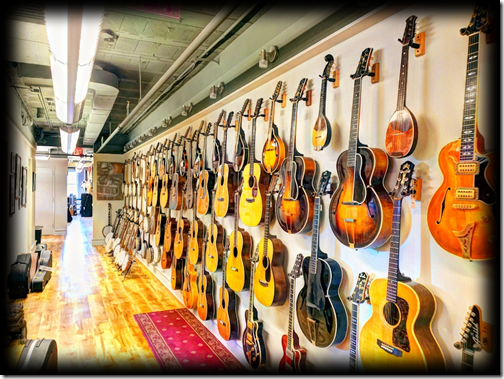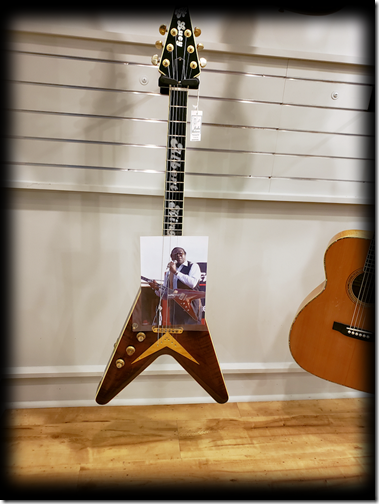My wife and I had an opportunity to travel to Nashville, and since Nashville has long-been hailed as the "Music City," I decided that I should take advantage of the situation to check out some of the local guitar shops while I was in town. As a brief bit of background, I have a good friend, Harold, whom I have known from my earliest days at Microsoft. Harold lives in Nashville now, but when the two of us lived in Seattle, we used to hit all of the guitar shops in that area from time to time. With that in mind, I pinged Harold prior to my arrival and suggested that we should plan to visit a couple of guitar stores while I was in town. (Because the algebraic formula for how many guitars a guy should own is G = N + 1, where "G" is the optimal number of guitars that you should own, and "N" is equal to the number of guitars that you currently own.)
Having said all of that, Harold and I spent a great afternoon visiting two stores, and here's the lowdown on them.
Store #1 - Carter Vintage Guitars
The first store we visited was Carter Vintage Guitars (www.cartervintage.com), which has thousands of vintage guitars, amps, and pedals...

On a personal note, it was a little disconcerting to see an original tape-based EchoPlex selling for $1250, since I sold mine for $50 way back in the 1980s. (At that time in my life I was a poor 20-something and I needed the cash.)
I tried out dozens of amazing guitars, all original and vintage, and most of them selling for a hefty price. (Hey - they are vintage guitars, after all.)
I didn't buy anything, but they had a beautiful 1974 Gibson EDS-1275 that I would have loved to bring home with me - if only I had the $7,500 to spend on it. [Deep Sigh.]
Store #2 - Gruhn Guitars
The next store that Harold and I visited was one that I had on my list before I arrived: Gruhn Guitars (www.guitars.com), which is a Nashville institution. They have two floors of guitars: the first floor had hundreds of guitars - many of the newer models are what you might expect in your typical guitar store are on that floor, although there were dozens of special gems scattered around, too...

The second floor has an amazing collection of vintage guitars, (although you need to talk to a salesperson to access that floor)...

I found a pristine 1918 Gibson Harp guitar on the second floor that would have found a nice home in my studio, but once again - the $7,500 price tag was more than I could muster.
There were several guitars nestled among the vintage collection that were even more valuable based on their previous owner; for example - one of the acoustic guitars had belonged to John Denver, and the following Flying V used to belong to the great Albert King...

As Harold and I were perusing the various vintage guitars on the second floor, we bumped into George Gruhn, the founder and owner of Gruhn Guitars. George is something of a legend in the Music City, and he's also the nicest guy you could ever meet.
George invited Harold and me into his office to see his amazing collection of - pythons. Yes, you read that correctly - George has a dozen or so pythons and other snakes in his office. The three of us talked about his collection of reptiles, and then George brought out a couple of his snakes for us to hold. Harold held a tiny but friendly pale-colored python, whereas I held a species of serpent that resembled a coral snake a little too close for comfort. He was a full-sized and quite curious fellow; he kept trying to inspect what I had in my pockets, and I had to keep shifting him from arm to arm in order to prevent him from falling. After ten or so minutes of reptilian admiration, we returned the snakes and resumed our discussion of guitars.
George had an amazing resonator guitar in his office, and the three of us took turns playing it; I played a little jazz piece on it, Harold played excerpts from a classical etude, and George played some amazing vintage improvisational fingerstyle (with hints of Celtic influence). This particular resonator had an amazing sound, but the price tag was a bit out of my range. (Although Harold was seriously contemplating adding it to his collection.)
As we discussed the various guitars we each owned, George shared a bit of his guitar wisdom with Harold and me. For example, he said that there are three primary reasons why someone buys a guitar:
- They don't have a guitar
- They want a better guitar
- They collect guitars (which all three of us obviously do)
We all laughed about George's observation, but George pointed out that many collectors do not seem to actually care about the quality; some of the collectors he meets are simply trying to fill a generic void in their collection. I responded that I buy different guitars for specific purposes; each of mine is unique and purchased for an individual sound or purpose.
George also produced a Martin that I played briefly, and when I commented that I much preferred the neck on my Taylor for playing fingerstyle, George produced a trio of Taylor prototypes that had not yet been assigned a specific model number. (One of the prototypes was personally signed by Bob Taylor and addressed to George.) I liked the Taylors much better; their necks were more like what I was accustomed to playing. After a few minutes George needed to head back to work, so Harold and I headed downstairs, where Harold continued to put the resonator from George's office through its paces while I browsed through the wide-ranging collection of acoustic guitars.
About ten minutes later George found me; he said that he had a 1946 Epiphone upstairs that he wanted to show me, so the two of us headed back upstairs to check it out. I own an 1965 Epiphone 12-string, and George's 1946 6-string was somewhat reminiscent of my guitar, (albeit in better shape than mine). I swapped out the Epiphone for one of the Taylor protoypes, then George picked up a 5-string banjo and started to play various melody lines in Old Americana, Celtic, and Klezmer/Yiddish styles as I tried to keep up with the rapid chord changes on the guitar. It was a fun, impromptu jam session between guitar geeks, and I had a blast.
Eventually Harold joined us on the second floor, and it was time for us to go. I had to meet my wife downtown for a previous engagement, so Harold and I bid George adieu and headed off into the proverbial Tennessee sunset.